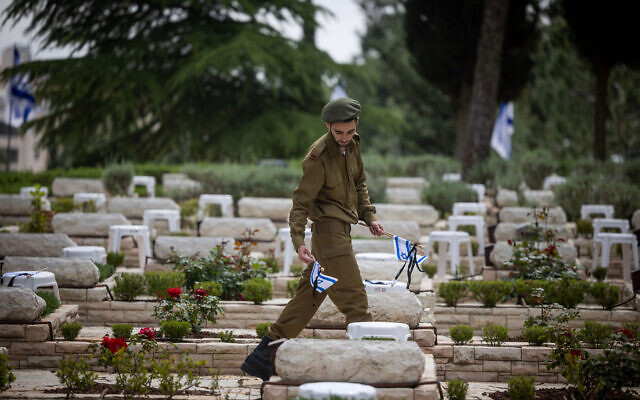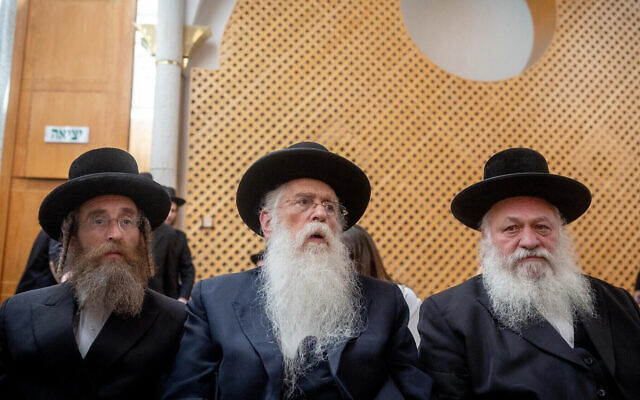Coalition ministers withdraw from Memorial Day events amid protests
Amid inflamed social divisions some bereaved family members have publicly called for government members who did not serve in the IDF to avoid attending the events.

A series of ministers and Knesset members in the coalition announced Sunday that they were canceling their appearance at official ceremonies at cemeteries during Memorial Day this week due to protests from some bereaved families.
United Torah Judaism’s Housing Minister Yitzhak Goldknopf and Culture and Sport Deputy Minister Ya’akov Tessler — neither of whom served in the IDF — announced their withdrawal from Memorial Day events at which they were slated to speak. Shas Minister Haim Biton also said he would skip a previously scheduled event.
Shortly afterward, Public Diplomacy Minister Galit Distel Atbaryan — who served in the military but has made incendiary comments that angered many veterans in recent months — also said she would skip the ceremony at which she was slated to speak.

Amid inflamed social divisions exacerbated by the government’s now-paused judicial overhaul push, some bereaved family members have publicly called for government members who did not serve in the IDF to avoid attending the events.
The prospect of the political battle over proposed changes to the judiciary spilling into cemeteries and wreath-laying ceremonies on Memorial Day, which runs from Monday night until Tuesday night, has sparked concerns that such activities could offend families and harm the sanctity of the day.
In a statement, Goldknopf said he “really wanted to come and honor the memory of the fallen. However, I was informed that alongside the bereaved families who asked for my arrival as a representative of the government, there are also bereaved families for whom my presence might cause discomfort.”
“This is not true, but I would prefer not to hurt their feelings. I do not, God forbid, want to act as a catalyst for disrupting this special and meaningful day,” Goldknopf said, adding that he would instead participate in the “heavy mourning” by reciting chapters from the Book of Psalms at the Western Wall in memory of the deceased.
Goldknopf and Tessler were set to speak at ceremonies in Kiryat Gat and Be’er Tuvia, respectively.
Likud’s Distel Atbaryan was originally scheduled to speak at a ceremony in Ness Ziona. In a lengthy Tweet, Distel Atbaryan said that “in front of bereaved families, I absolutely bow my head… I won’t come to the ceremony.”
Distel Atbaryan was previously criticized for labeling air force pilots who threatened to refuse to serve over the government’s now-paused judicial makeover as “weaklings fallen by the wayside… I despise each and every one of them.” She later apologized for the comments.
“The fact that a person like me can no longer come to the cemetery on Memorial Day is further evidence of the politicization of everything, a politicization that is slowly but surely sawing the branch we all sit on,” Distel Atbaryan tweeted Sunday, clarifying, however, that she did not blame the families for the societal rifts.
Biton, a minister in the Education Ministry who did not serve in the army, dropped out of a Memorial Day ceremony in the central city of Rehovot. In his place, newly appointed Interior and Health Minister Moshe Arbel, who did serve, will attend the commemoration, Army Radio reported.
Zvika Fogel, of the far-right Otzma Yehudit party, said he would attend a Memorial Day event at the Rosh Pina Military Cemetery but would not give a speech.
“The honor of the fallen and of the bereaved families is more important than my honor,” Fogel told 103FM, adding that he did not want to provide a platform for anti-government protesters to “hurt the feelings of the families.”
But National Security Minister Itamar Ben Gvir — who famously was not drafted in the IDF due to his extremist activity as a teenager — reiterated Sunday that he will not heed the calls for him to skip a ceremony at the Beersheba Military Cemetery on Tuesday.
“I love the bereaved families. I will give a statesmanlike speech and embrace all the families, including those who do not love me,” Ben Gvir was quoted as saying by Ynet.
Public figures have increasingly urged both the public and elected officials to keep political statements out of the solemn day.
IDF Chief of Staff Herzi Halevi asked Israelis to show respect and refrain from turning military cemeteries into a “scene of debate.” Prime Minister Benjamin Netanyahu and Defense Minister Yoav Gallant — as well as the opposition’s Yair Lapid and Benny Gantz — have also urged Israelis to put aside their deep divisions for one day this week.
In addition to the call by Netanyahu, Gallant, Lapid and Gantz, a group representing reservist soldiers protesting against the government’s judicial overhaul called on its activists not to demonstrate against the reforms during Memorial Day.
Israel’s Memorial Day will commence on Monday evening when a one-minute siren will blare across the country. On Tuesday morning, a two-minute siren will sound ahead of national memorial ceremonies at Israel’s 52 military cemeteries.
Memorial Day is one of Israel’s few national, non-religious holidays, during which large swaths of the Israeli public typically visit the graves of loved ones and comrades.
Fifty-nine soldiers were killed during their military service since Israel’s last Memorial Day, according to figures released by the Defense Ministry on Friday.
Another 86 disabled veterans died due to complications from injuries sustained during their service. The numbers brought the total to 24,213 of those who have died during service to the country since 1860.
TIMES OF ISRAEL

comments